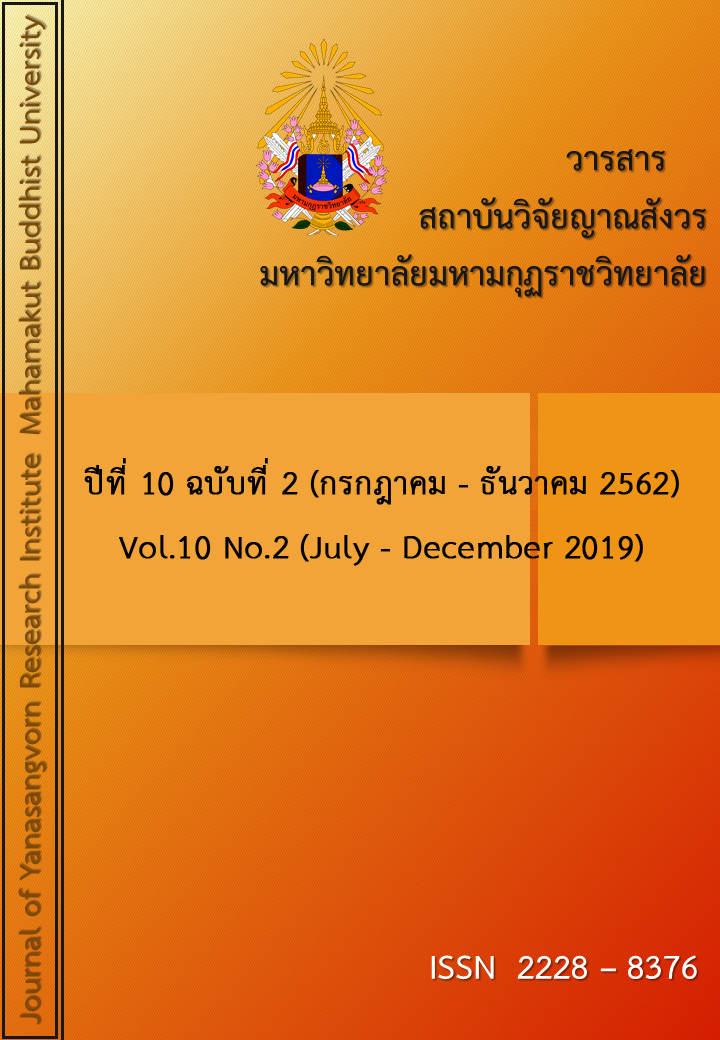THE POLITICAL COMMUNICATION VIA SHADOW PLAY IN SOUTH OF THAILAND : DURING POLITICAL CRISIS BETWEEN 2548 – 2558 B.E.
Main Article Content
Abstract
This research aimed to study: 1) a political context that effect the political communication via shadow play in South of Thailand during political crisis between 2548 – 2558 B.E. 2) a process of political communication of shadow play in South of Thailand which include of patterns, contents, and methods during political crisis between 2548 – 2558 B.E. To study a process of political communication of shadow play in South of Thailand to Thai as receivers while the shadow play as communicator during political crisis between 2548 – 2558 B.E. This was a qualitative research using in depth interview and documentary analysis. The key informants were 8 shadow play performers and audiences. The findings revealed that the political context effected the communication of shadow play performers to the audiences. The shadow play performers tailored the narrative to suited to the context and situation of politics in order to entertain and educated the audiences about political issues. These findings consistent with Berlo’s Model that emphasized the role of shadow play performer as communicator of politics information towards the audience by using various approaches, which are live show, electronics devices and online website. The local dialect was used to ensure the understanding between performers and audiences. The communication skills, attitude, knowledge and culture were the keys factors of effective communication process. This study shed the light that shadow play performer is the effective tool to nurture political knowledge among local people. The political attitude of shadow play performers influence the political attitude of audiences. Shadow play a folk media as a tool instruct political efficiently. And shadow play in south is a folk media. That can’t continue to exist without the audience is a new generation.
Article Details
References
นันทนา นันทวโรภาส.(2549). สื่อสารการเมือง:ทฤษฎีและการประยุกต์ใช้. กรุงเทพฯ: สำนักพิมพ์สถาพรบุ๊คส์.
บุญชิรา ภู่ชนะจิต(2559). การสื่อสารทางการเมืองผ่านสื่อพื้นบ้าน : กรณีศึกษาคณะหนังประโมทัยในภาคตะวันออกเฉียงเหนือ.ปรัชญาดุษฎีบัณฑิต(สื่อสารการเมือง)วิทยาลัยสื่อสารการเมือง มหาวิทยาลัยเกริก.
ปิยตา สุนทรปิยะพันธ์ (2560).การสื่อสารในการเผยแพร่ความรู้ทางการเมืองผ่านหนังตะลุงของนาหนัง ประเคียง ระฆังทอง.ปรัชญาดุษฎีบัณฑิต (นิเทศศาสตร์) มหาวิทยาลัยสุโขทัยธรรมาธิราช.
ปรีดา นัคเร. (2549). แนวทางการส่งเสริมหนังตะลุงสำหรับกลุ่มผู้รับสารวัยรุ่นในจังหวัดสงขลา. วิทยานิพนธ์ ว.ม. กรุงเทพฯ : มหาวิทยาลัยธรรมศาสตร์.
พิทยา บุษรารัตน์(2547).หนังตะลุงและโนราห์ในบริบทของโครงสร้างและพลวัตรทางสังคมวัฒนธรรมภาคใต้.วารสารทักษิณคดี 7 (1) : 110
ลิขิต ธีรเวคิน.(2549). วิวัฒนาการการเมืองการปกครองไทย, พิมพ์ครั้งที่ 9. กรุงเทพฯ:สำนักพิมพ์มหาวิทยาลัยธรรมศาสตร์.
วิมลมาศ ปฤชํากุล(2550).“อัตลักษณ์พื้นถิ่นในบันเทิงคดีภาคใต้.” วิทยานิพนธ์อักษรศาสตรดุษฎีบัณฑิต จุฬาลงกรณ์มหาวิทยาลัย.
เสถียร เชยประทับ.(2540). การสื่อสารกับการเมืองเน้นสังคมประชาธิปไตย. กรุงเทพฯ : สำนักพิมพ์จุฬาลงกรณ์มหาวิทยาลัย.
อุดม หนูทอง.(2531). ดนตรีและการละเล่นพื้นบ้านภาคใต้. สงขลา : ภาควิชาภาษาไทยและภาษาตะวันออก คณะมนุษย์ศาสตร์ มหาวิทยาลัยศรีนครินทรวิโรฒสงขลา.
David K. Berlo.(1960). The Process of Communication. New York: HollRinehartand Winston.
Tuan Prommet. (1989). Play on language Play on word. Songkhla: Rajabhat University. (In Thai)


